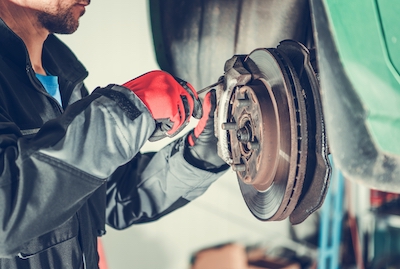Brakes - OK Tire Of North Lauderdale, FL
Repair of a Brake Master Cylinder
A crucial part of your car's braking system is the brake master cylinder. It is crucial in ensuring your safety while driving. The master cylinder may need maintenance or repair over time, just like the rest of your car. In this article, we'll go over the ins and outs of brake master cylinder repair, from comprehending how it works to recognizing common problems and how to fix them.
The Brake Master Cylinder: Understanding
The hydraulic pressure in your car's brake system is produced by the brake master cylinder. The brake pedal pushes a piston inside the master cylinder, forcing brake fluid into the brake lines as you apply pressure. brake pad replacement Palm Aire, FL. The brake pads or shoes press against the rotors or drums as a result of this activating the brake calipers or wheel cylinders, which ultimately slows down or stops your car.
Brake Master Cylinder Issues: Signs
Finding problems with your brake master cylinder is essential for preserving safe driving conditions. The following are some typical symptoms of a brake master cylinder problem:
North Lauderdale, FL Auto Repair - Brakes, Alignment
- Soft or Spongy Brake Pedal: If your brake pedal feels spongy or soft when you apply pressure, it may indicate a master cylinder problem or air in the brake lines.
- Leaks of brake fluid: Look for any obvious leaks near the master cylinder. Leaks can be a sign of failed seals or gaskets.
- Low Brake Fluid: A sudden drop in the reservoir's brake fluid level may indicate a master cylinder problem.
- Brake Warning Light: It's crucial to have the master cylinder checked if the brake warning light on the dashboard of your car turns on.
- Difficulty Braking: A failing master cylinder may be the cause of your car's difficulty coming to a stop or the delay in responding when you press the brake pedal.
Inspection of a Diy Brake Master Cylinder
You can conduct a simple inspection of your brake master cylinder before deciding whether to repair or replace it. How to do it:

- Check the master cylinder and brake lines for any obvious leaks as part of the visual inspection process. Leaks are a definite sign of trouble.
- Check the brake fluid reservoir. Brake Fluid Level. If it's noticeably low, it might be a problem. Also, pay attention to the fluid's condition; if it seems soiled or contaminated, it might need to be changed.
- Press the brake pedal while the engine is running to feel the pedal. There may be a master cylinder issue if it feels soft or falls to the ground.
Repairing a Brake Master Cylinder Steps
You might need to make repairs if your inspection reveals a broken brake master cylinder. The following are the general procedures:
- Gather Your Tools: To fix the master cylinder, you'll need fresh brake fluid, a tube or hose for bleeding the brakes, an emergency catch pan, the flare nut wrench, and the brand-new master-cylinder kit( which typically comes with the seals and gaskets ).
- Prepare the vehicle by applying the parking brake and parking your car on a flat surface. Make sure your engine is not running.
- Remove the old Master Cylinder: Using the flare nut wrench, begin by removing the brake lines from the old master cylinder. The master cylinder from the brake booster should then be unbolted.
- Install the New Master Cylinder: From your kit, install the new master cylinder in accordance with the manufacturer's instructions. Make sure to use the gaskets and seals that are provided.
- Bleed the Brakes: To remove any air from the system, you'll need to bleed the brakes after installing the new master cylinder. For proper brake operation to be maintained, this step is essential.
- Check for Leaks: After bleeding the brakes, look for any leaks in the vicinity of the new master cylinder.
- Top Up Brake Fluid: Use the proper kind of brake fluid to replenish the reservoir. For the correct specification, consult the manual of your car.
- Take your car for a test drive to make sure the brakes are functioning properly.
When to ask for Expert Assistance
While some seasoned Diyers may attempt to repair brake master cylinders, it's important to be aware of your limitations. It is safer to seek professional assistance if you are unsure or uneasy about any aspect of the repair procedure. Brakes are an important safety component, and any mistakes made during repair could result in accidents.
Pompano Beach, FL Auto Repair - Brakes, Alignment
Regular maintenance is crucial.
Often, prevention is more economical than repair. Consider these maintenance suggestions to increase the life of your brake master cylinder and ensure your safety:

- Regular Inspections: Check the brake fluid reservoir and look for leaks on a regular basis.
- Brake Fluid Replacement: Adhere to the suggested schedule provided by your car's manufacturer.
- Brake System Flush: To get rid of old, contaminated brake fluid, think about a thorough brake system flush.
- Brake Pad and Rotor Inspection: Pay attention to your brake pads and rotors because damaged parts can put the master cylinder under additional stress.
Conclusion
The brake master cylinder in your car is an important part that needs care and attention. Accidents can be avoided and your safety on the road is guaranteed by identifying the symptoms of problems and addressing them right away through repair or replacement. Keep in mind that it's always best to consult a qualified mechanic if you're unsure about performing the repair yourself.

Repairing the brake master cylinder should not be taken lightly because it directly impairs your ability to safely stop your car. You can maintain a dependable and secure braking system for your car by being vigilant and resolving any problems as soon as possible.
click this read the article